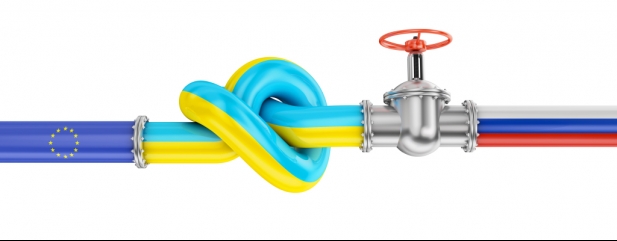Archived article
Please note that tax, investment, pension and ISA rules can change and the information and any views contained in this article may now be inaccurate.
ESG investing faces a watershed after Russia’s invasion of Ukraine

Given how widely telegraphed the build-up to war was, it seems unthinkable that politicians and businesses were unaware of the risk that Russia might actually invade Ukraine.
With the invasion now a terrible reality, they are all rushing to reappraise their attitudes and exposure to Russia.
Meanwhile investors, many of whom have spent the last month frantically checking if companies in which they own shares have any exposure to Russia, are now scrutinising their portfolios for other potential unforeseen ESG (environmental, social and governance) risks.
MORAL DIMENSION
Most governments have condemned Russia’s actions, but some are still heavily reliant on the country for much of their energy supply.
Germany, for one, is a large consumer of natural gas and relies on Russia for half of its imports.
Despite its parliament condemning the war, Germany’s minister for economic affairs expressed the view that where energy policy is concerned a moral dimension ‘does not really exist’.
In order to reduce its dependence on Russian gas, Germany is currently seeking alternative supplies from Qatar and the UAE.
Yet both countries have faced criticism over the years for their attitudes towards civil rights.
The UK, another big energy importer, has recently courted Saudi Arabia, which has been condemned by the United Nations for routinely executing people without trial.
The problem for European politicians is, due to a random combination of geology and ideology, most of the world’s fossil fuel reserves are located in faraway countries run by people with dubious human rights records.
WRONG SIDE OF HISTORY
For companies which operate in Russia, the invasion of Ukraine has forced them to decide on the very future of their businesses.
One or two have decided to hold their noses and continue as normal, but the vast majority have correctly ‘read the room’ and ceased trading even though it means forgoing significant revenues.
Jon Hale, director of sustainability research at Sustainalytics, part of Morningstar, says companies that are shunning Russia ‘are opening up a whole new front for ESG engagement, setting precedents for how we invest in the future’.
Investors tend to think of ESG as being mostly about the environment and much less about social and governance issues.
For companies though, ESG is about creating a net positive impact for their customers, their employees, their stakeholders and the wider world.
One way a company can do that ‘is by being a responsible actor on the public stage when conditions warrant it, rather than shying away from taking stands’, says Hale.
As of mid-March, more than 300 international companies had withdrawn from Russia, either of their own volition or due to pressure from stakeholders.
By stopping trading, they are depriving themselves and their stakeholders of income but more importantly they are depriving the Russian economy of revenues with which to wage war.
Meanwhile, overseas assets belonging to Russia’s central bank have been seized and several of its retail and commercial banks have been frozen out of the SWIFT global financial payments system.
Regardless of the outcome of the conflict in Ukraine, Russia has become an international pariah and is likely to remain so for years to come.
ENERGY CONUNDRUM
As the price of oil and natural gas has skyrocketed there have been calls to step up fossil fuel production.
Energy firms which just a few months ago were burnishing their ‘green’ credentials and turning their back on developing new fields are now rethinking their strategies at the prospect of soaring profits.
Yet the longer-term implications of the spike in energy prices are clear: the UK, along with the rest of the world, needs more alternative sources of energy and sooner rather than later.
‘Russia’s invasion of Ukraine underscores the urgency of shifting to renewable energy’, says Hale.
‘It’s not only about climate change but also more clearly than ever also about ending our dependence on Russia for oil and gas, especially in Europe, because that dependence essentially is financing the invasion, not to mention other autocratic petrostates.’
The European Union, which buys an estimated $800 million of Russian gas every day, has set out ambitious plans to cut Russian imports by two thirds within a year while still hitting its 2030 greenhouse gas emissions targets.
The plans call for more rooftop solar panels, heat pumps and energy saving measures for households, accelerating the decarbonisation of industry by switching to electrification and renewable hydrogen, speeding up renewable power investment and doubling biomethane production.
To secure Europe’s future energy needs, however, compromises have to be made.
Work on the Baltic Pipe between the Norwegian sector of the North Sea and Poland has restarted after it was halted last year thanks to ecological concerns, which will displease environmentalists but in the long term will reduce the need for Russian gas.
HIGHER STANDARDS
If companies pulling out of Russia decisively has been a positive surprise from a governance perspective, a big negative surprise has been the discovery that many ESG funds owned fossil-fuel, mining or weapons-manufacturing companies.
Bloomberg points out that at the start of March the largest ESG-focused fund, the US-listed $22.9 billion iShares ESG Aware MSCI USA ETF, had over 3% of its assets invested just in the oil and gas sector, ‘the industry most responsible for the accelerating destruction of the planet’s atmosphere’.
ESG funds also had more than $8 billion invested directly in Russian government bonds and companies. While the amount is small by comparison with the total amount of assets in ESG funds, ‘the revelation has turbocharged scepticism about the merits of ESG investing’ says Bloomberg.
Despite Russia having a long history of corruption, and the imposition of international sanctions following its annexation of Crimea in 2014, there seems to be no statistical ‘screen’ to stop ESG funds from investing in say the country’s banks or other firms not directly involved in fossil fuels or mining.
MOMENT OF TRUTH
Writing in the Financial Times, former Ukrainian finance minister Natalie Jaresko called Russia’s invasion ‘a moment of truth’ for the global business community.
Companies ‘must understand that nurturing, upholding, and protecting freedom and democracy is part of their ESG responsibility’, says Jalesko.
All too often, ‘corporations and their executives engage in marketing or obfuscation of what they’re actually doing — what could more accurately be called “ESG-washing”’.
ESG matters in 2022
As long-term proponents of investing responsibly we believe that ESG matters year in year out. In early 2022 we have seen social issues come to the fore as the tragic events in Ukraine unfold. These serve as a reminder that we need to question companies’ exposure to regimes complicit in human rights abuses.
Climate change also sits high on the agenda. 2021 saw the political impetus behind tackling climate change gain traction – culminating in the commitments made by governments and businesses at COP26. However, questions remain about whether these promises are credible. 2022 will see renewed focus on implementation – turning words and declarations to concrete actions.
We’ve made the commitment that our portfolio will be net zero by 2050 and we’re also working hard engaging with the companies we invest in to ensure that they’re on track for meeting – or ideally beating – the commitments they’ve made.
The movement away from a reliance on fossil fuels will play a crucial role in achieving net zero. The importance of this issue has been underlined by the recent spike in oil & gas prices that have seen our own household energy bills rocket. We see real opportunities in companies related to the energy transition, and this will be a theme throughout 2022 and beyond.
Important information:
These articles are provided by Shares magazine which is published by AJ Bell Media, a part of AJ Bell. Shares is not written by AJ Bell.
Shares is provided for your general information and use and is not a personal recommendation to invest. It is not intended to be relied upon by you in making or not making any investment decisions. The investments referred to in these articles will not be suitable for all investors. If in doubt please seek appropriate independent financial advice.
Investors acting on the information in these articles do so at their own risk and AJ Bell Media and its staff do not accept liability for losses suffered by investors as a result of their investment decisions.
Issue contents
Editor's View
Feature
- Invest with confidence - four funds which make a perfect portfolio
- European shares tend to do well when the US raises interest rates... not this time?
- Why Trainline still faces a big test despite ticket commission win
- Our 2022 stock portfolio rises against a volatile market backdrop
- ESG investing faces a watershed after Russia’s invasion of Ukraine
Great Ideas
- Euromoney set to benefit from strong growth as data-driven businesses excite
- Zoo Digital sets up shop in Scandi-thriller homeland after Bollywood move
- Invest in Rathbones as a wealth management bid frenzy highlights value appeal
- Soaring book sales help publisher Bloomsbury beat sales and profit expectations
- Casual dining group The Fulham Shore offers great scope for growth
- Belvoir continues to enjoy strong tailwinds in the UK property market

 magazine
magazine











